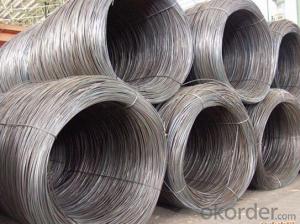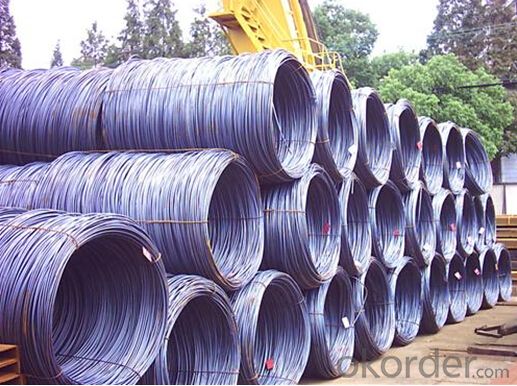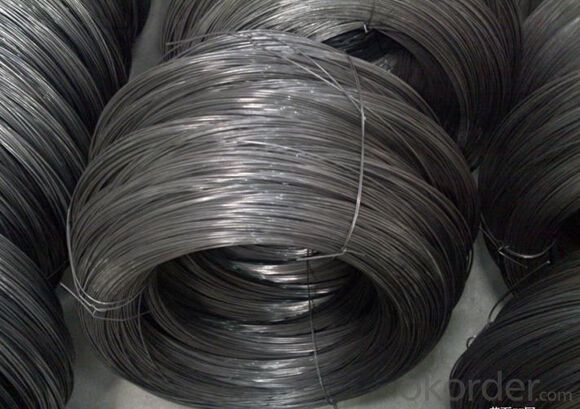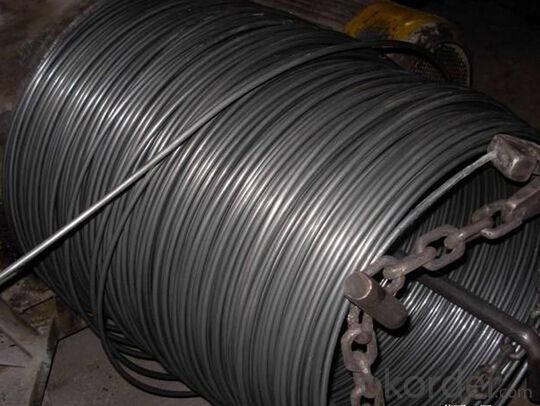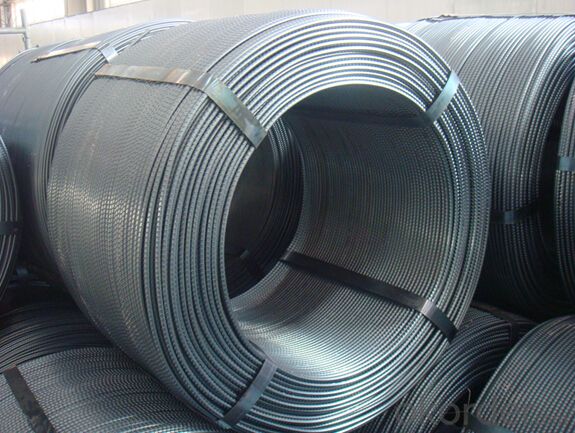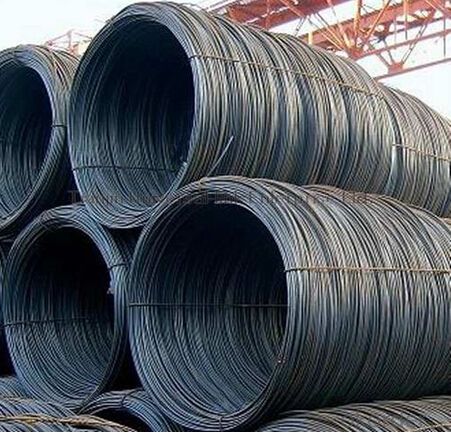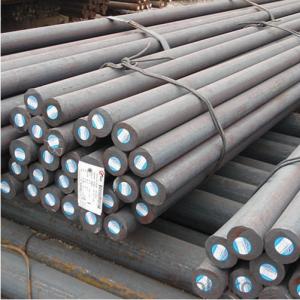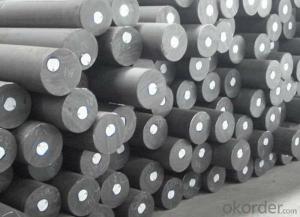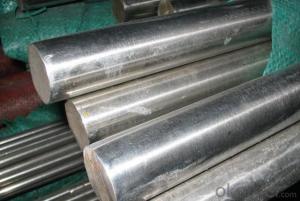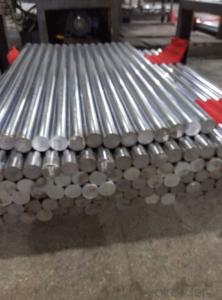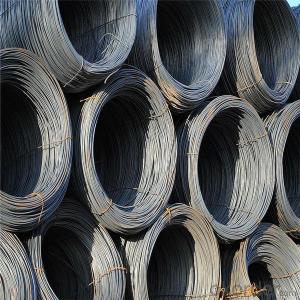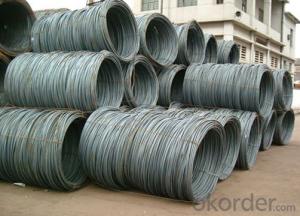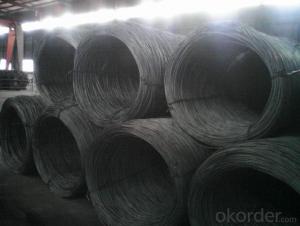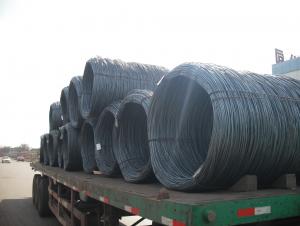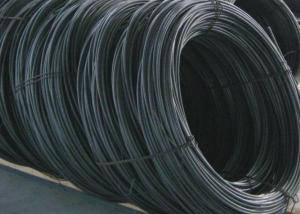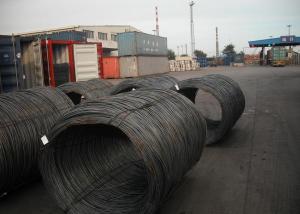DIN 17223 GRADE A B C D High Carbon Hot Rolled Spring Steel Wire Rod
- Loading Port:
- Tianjin
- Payment Terms:
- TT OR LC
- Min Order Qty:
- 25 m.t.
- Supply Capability:
- 10000 m.t./month
OKorder Service Pledge
OKorder Financial Service
You Might Also Like
Specification
DIN 17223 GRADE A B C D High Carbon Hot Rolled Spring Steel Wire Rod
Specification
Standards: | DIN 17223-1 Round Steel Wire For Springs |
DIN EN 10270-1 Steel Wire For Mechanical Springs | |
GB 3206-82 Carbon Constructional Quality Steel Wire | |
JIS G 3521-1991 Hard Drawn Steel Wire | |
GB 4357-89 Carbon Spring Steel Wire | |
YB/T 5220-93 Carbon Steel Wire For Non-Mechanical Springs | |
Steel Grade: | 30MnSi, SWRH62A,SWRH62B, SAE1060, SAE1065, 65Mn, SAE1070, SAE1075,SWRH72A, SWRH72B, SWRH77A, SWRH77B, SAE1080,SWRH82A, SWRH82B,C82DA. |
Wire Rod: | Shagang Steel Wire Rod |
Wire Diameter: | 0.20mm-12.50mm |
MOQ: | 25 TON |
Coil weight: | 20-1200KG |
Delivery time : | Within 7 days after receiving your deposite or L/C at sight |
Payment term: | T/T or L/C at sight |
FCL weight: | 20-27 tons (20’GP) |
Package: | in coil, with carrier, hard paper Z2,Z3,ect... |
Sample: | Available for further evaluation |
Usages: | Mechanical Equipment, Engineering Vehicle, Motor Vehicle, Motorcycle, Accumulator Car, Bicycle, Fitness Equipment, Elevator, Steel Wire Screen, Mattress And Sofa, Umbrella Frame, Electronic Products, ect. |
Spring Usages: | compression spring, torsion spring, extension spring, agricultural machines, die springs, strip & wire forming springs. |
Chemical Composition
Grade | C % | Si % | Mn % | P % | S % |
SAE1005 | 0.06 max | 0.10-0.25 | 0.35 max | 0.030 max | 0.030 max |
SAE1006 | 0.08 max | 0.10-0.25 | 0.25-0.40 | 0.030 max | 0.030 max |
SAE1008 | 0.10 max | 0.10-0.25 | 0.30-0.50 | 0.030 max | 0.030 max |
SAE1010 | 0.08-0.13 | 0.10-0.25 | 0.30-0.60 | 0.030 max | 0.030 max |
SAE 1015 | 0.12-0.19 | 0.17-0.37 | 0.35-0.65 | 0.035 max | 0.030 max |
SAE1016 | 0.13-0.18 | 0.10-0.25 | 0.30-0.60 | 0.030 max | 0.030 max |
15MN | 0.13-0.18 | 0.10-0.25 | 0.60-0.90 | 0.030 max | 0.030 max |
SAE1020 | 0.18-0.23 | 0.10-0.25 | 0.30-0.60 | 0.030 max | 0.030 max |
20Mn | 0.18-0.23 | 0.10-0.25 | 0.60-0.90 | 0.030 max | 0.030 max |
SAE 1025 | 0.22-0.30 | 0.17-0.37 | 0.50-0.80 | 0.035 max | 0.035 max |
Q 195 | 0.06-0.12 | 0.25-0.50 | 0.30 max | 0.050 max | 0.045 max |
Q235 | 0.22 max | 0.30 max | 0.55 max | 0.045 max | 0.050 max |
SAE 1030 | 0.28-0.34 | 0.10-0.25 | 0.30-0.60 | 0.030 max | 0.030 max |
30Mn | 0.28-0.34 | 0.10-0.25 | 0.60-0.90 | 0.030 max | 0.030 max |
SWRH 32 | 0.29-0.36 | 0.15-0.35 | 0.30-0.60 | 0.030 max | 0.030 max |
SAE 1035 | 0.32-0.40 | 0.17-0.37 | 0.50-0.80 | 0.035 max | 0.035 max |
SWRH 37 | 0.34-0.41 | 0.15-0.35 | 0.30-0.60 | 0.030 max | 0.030 max |
SWRH42A | 0.39-0.46 | 0.15-0.35 | 0.30-0.60 | 0.030 max | 0.030 max |
SWRH42B | 0.39-0.46 | 0.15-0.35 | 0.60-0.90 | 0.030 max | 0.030 max |
SWRH47A | 0.44-0.51 | 0.15-0.35 | 0.30-0.60 | 0.030 max | 0.030 max |
SAE1040/ 40# | 0.37-0.45 | 0.17-0.37 | 0.30-0.60 | 0.030 max | 0.030 max |
SAE1045/ 45# | 0.40-0.50 | 0.10-0.25 | 0.30-0.60 | 0.030 max | 0.030 max |
SWRH47B | 0.44-0.51 | 0.15-0.35 | 0.60-0.90 | 0.030 max | 0.030 max |
SAE 1050 | 0.47-0.55 | 0.17-0.37 | 0.50-0.80 | 0.035 max | 0.035 max |
SWRH52A | 0.49-0.56 | 0.15-0.35 | 0.30-0.60 | 0.030 max | 0.030 max |
SWRH52B | 0.49-0.56 | 0.15-0.35 | 0.60-0.90 | 0.030 max | 0.030 max |
SWRH57A | 0.54-0.61 | 0.15-0.35 | 0.30-0.60 | 0.030 max | 0.030 max |
SWRH57B | 0.54-0.61 | 0.15-0.35 | 0.60-0.90 | 0.030 max | 0.030 max |
SAE 1055 | 0.52-0.60 | 0.17-0.37 | 0.50-0.80 | 0.035 max | 0.035 max |
SAE1060/ 60# | 0.55-0.65 | 0.10-0.25 | 0.30-0.60 | 0.030 max | 0.030 max |
SWRH62A | 0.59-0.66 | 0.15-0.35 | 0.30-0.60 | 0.030 max | 0.030 max |
SWRH62B | 0.59-0.66 | 0.15-0.35 | 0.60-0.90 | 0.030 max | 0.030 max |
SWRH67A | 0.64-0.71 | 0.15-0.35 | 0.30-0.60 | 0.030 max | 0.030 max |
SWRH67B | 0.64-0.71 | 0.15-0.35 | 0.60-0.90 | 0.030 max | 0.030 max |
SAE1070/ 70# | 0.65-0.75 | 0.10-0.25 | 0.30-0.60 | 0.030 max | 0.030 max |
SAE 1075 | 0.72-0.80 | 0.17-0.37 | 0.30-0.60 | 0.035 max | 0.035 max |
SWRH72A | 0.69-0.76 | 0.15-0.35 | 0.30-0.60 | 0.030 max | 0.030 max |
SWRH72B | 0.69-0.76 | 0.15-0.35 | 0.60-0.90 | 0.030 max | 0.030 max |
SWRH77A | 0.74-0.81 | 0.15-0.35 | 0.30-0.60 | 0.030 max | 0.030 max |
SWRH77B | 0.74-0.81 | 0.15-0.35 | 0.60-0.90 | 0.030 max | 0.030 max |
SAE1080/ 80# | 0.75-0.88 | 0.10-0.25 | 0.60-0.90 | 0.030 max | 0.030 max |
SWRH82A | 0.79-0.86 | 0.15-0.35 | 0.30-0.60 | 0.030 max | 0.030 max |
SWRH82B | 0.79-0.86 | 0.15-0.35 | 0.60-0.90 | 0.030 max | 0.030 max |
SAE 1080 | 0.75-0.88 | 0.10-0.25 | 0.60-0.90 | 0.030 max | 0.030 max |
SAE 1085 | 0.82-0.90 | 0.17-0.37 | 0.50-0.80 | 0.035 max | 0.035 max |
1215/SUM23 | 0.05-0.16 | 0.15 max | 0.70-1.20 | 0.05-0.10 | 0.10-0.35 |
Company Information
CNBM International Corporation is the most import and export platform of CNBM group(China National Building Material Group Corporation) ,which is a state-owned enterprise, ranked in 270th of Fortune Global 500 in 2015.
With its advantages, CNBM International are mainly concentrate on Cement, Glass, Iron and Steel, Ceramics industries and devotes herself for supplying high quality series of refractories as well as technical consultancies and logistics solution.
After-sale service | CNBM provides the services and support you need for every step of our cooperation. We’re the business partners you can trust; you can relax and get on with doing business. |
For any problem, please kindly contact us at any your convenient time, we’ll reply you in our first priority within 24 hours | |
Advantages | Industry experience over 20 years. |
Shipment of goods -More than 70 countries worldwide. | |
The most convenient transport and prompt delivery. | |
Competitive price with best service. | |
High technical production line with top quality products. | |
High reputation based on best quality products. |
Products Show
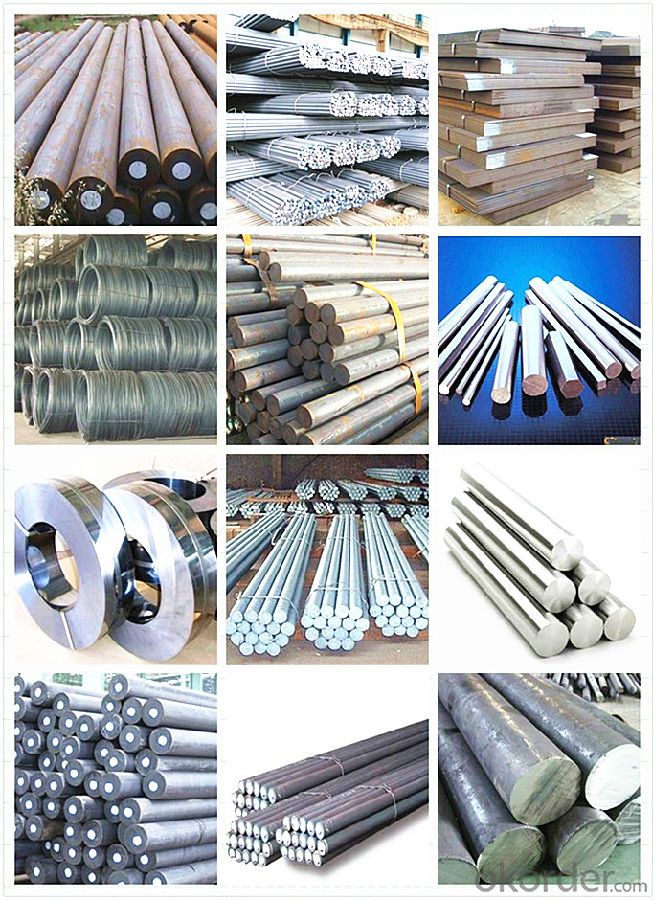
FAQ
Are you a trading company or manufacturer? | Manufacturer |
What’s the MOQ? | 3 metric ton |
What’s your delivery time? | 15-35 days after downpayment received |
Do you Accept OEM service? | Yes |
what’s your delivery terms? | FOB/CFR/CIF |
What's the Payment Terms? | 30% as deposit,70% before shipment by T/T |
Western Union acceptable for small amount. | |
L/C acceptable for large amount. | |
Scrow ,Paybal,Alipay are also ok | |
Why choose us? | Chose happens because of quality, then price, We can give you both. |
Additionally, we can also offer professional products inquiry, products knowledge train (for agents), smooth goods delivery, excellent customer solution proposals. | |
What's your available port of Shipment? | Main Port, China |
What’s your featured services? | Our service formula: good quality+ good price+ good service=customer's trust |
Where are your Market? | Covering more than 160 countries in the world |
- Q: What are the main characteristics of spring steel?
- Spring steel is a type of high-carbon steel that is specifically designed to possess excellent elasticity and resilience. It is primarily known for its ability to return to its original shape after being bent or deformed, making it ideal for applications where repeated and controlled deflection is required. The main characteristics of spring steel include: 1. High Yield Strength: Spring steel is characterized by its high yield strength, which refers to the amount of stress it can withstand before permanent deformation occurs. This allows it to bear heavy loads and resist bending or breaking under pressure. 2. Excellent Elasticity: One of the most significant characteristics of spring steel is its exceptional elasticity. It can be flexed, twisted, or stretched without permanently deforming, and once the force is released, it returns to its original shape. This property is crucial for applications requiring constant and repetitive motion. 3. Superior Fatigue Resistance: Spring steel is exceptionally resistant to fatigue, meaning it can endure millions of cycles of stress without failing. This characteristic is crucial for products subjected to continuous and repetitive loads, such as springs in automotive suspensions or industrial machinery. 4. Good Hardness and Wear Resistance: Spring steel is typically hardened to enhance its wear resistance. This allows it to withstand abrasion and deformation under harsh conditions, making it suitable for applications that involve friction or impact, such as cutting tools or automotive components. 5. Excellent Formability: Spring steel can be easily formed into various shapes and sizes, making it highly versatile for different applications. It can be cold-drawn, rolled, or heat-treated to achieve specific mechanical properties, allowing manufacturers to customize its characteristics based on their specific requirements. Overall, the main characteristics of spring steel are its high yield strength, excellent elasticity, superior fatigue resistance, good hardness and wear resistance, and exceptional formability. These qualities make it a vital material in a wide range of industries, including automotive, aerospace, construction, and manufacturing.
- Q: How does special steel perform in extreme pressure conditions?
- Special steel is specifically designed to perform exceptionally well in extreme pressure conditions. Due to its unique composition and manufacturing process, special steel exhibits high strength, durability, and resistance to deformation, making it ideal for applications where extreme pressures are involved. When subjected to extreme pressure conditions, special steel is able to maintain its structural integrity without undergoing significant deformations. This is due to its high tensile strength, which enables it to withstand tremendous forces without breaking or bending. Additionally, the special steel's hardness and toughness allow it to resist wear and damage caused by the intense pressure. Furthermore, special steel possesses excellent heat resistance, which is crucial in extreme pressure conditions where elevated temperatures are often present. The steel's ability to withstand high temperatures without losing its mechanical properties ensures its reliability and effectiveness even under the most demanding circumstances. Moreover, special steel has excellent corrosion resistance properties, making it suitable for use in extreme pressure conditions where exposure to corrosive substances is a concern. The steel's resistance to oxidation and other chemical reactions prevents it from deteriorating or weakening, ensuring its long-term performance and reliability. Overall, special steel performs exceptionally well in extreme pressure conditions due to its high strength, durability, resistance to deformation, heat resistance, and corrosion resistance. These properties make it a reliable and efficient choice for various industries and applications that operate under extreme pressure environments, such as oil and gas exploration, aerospace, automotive, and heavy machinery manufacturing.
- Q: How is weathering steel used in outdoor structures?
- Weathering steel, also known as Corten steel, is commonly used in outdoor structures due to its unique properties. It forms a protective rust-like layer on its surface, which not only enhances its aesthetic appeal but also acts as a barrier against further corrosion. This makes weathering steel a popular choice for outdoor sculptures, bridges, building facades, and other structures that are exposed to the elements. Additionally, its durability and low maintenance requirements make it a cost-effective and sustainable option for long-lasting outdoor constructions.
- Q: What are the different methods of surface anodizing for special steel?
- Surface anodizing for special steel can be achieved through various methods, each with its own advantages and applications. Below are some of the different techniques available: 1. Chromic Acid Anodizing: By immersing the steel in a chromic acid solution, a thin, hard, and corrosion-resistant oxide layer forms on its surface. This method is particularly effective for enhancing durability and aesthetic appeal, as it enables excellent adhesion for paint and other coatings. 2. Sulfuric Acid Anodizing: Widely utilized, this method involves immersing the steel in a sulfuric acid bath and applying a direct current to create an oxide layer on the surface. It offers exceptional corrosion resistance, increased hardness, and improved wear resistance. Additionally, it provides a solid foundation for achieving various colors and finishes by applying dyes or sealing. 3. Phosphoric Acid Anodizing: Primarily used for stainless steel, phosphoric acid anodizing entails immersing the steel in a phosphoric acid solution and applying a direct current. This process generates a protective oxide layer that enhances corrosion resistance and yields a uniform matte finish. Phosphoric acid anodizing is commonly employed in applications where aesthetics are not a priority. 4. Titanium Anodizing: This method involves anodizing steel using titanium electrodes, resulting in a thick oxide layer on the surface. The outcome is improved corrosion resistance, increased hardness, and enhanced wear resistance. Titanium anodizing finds significant usage in industries like aerospace, where robust and durable surface properties are vital. 5. Hard Anodizing: Distinguished by its specialized nature, hard anodizing produces a thick and highly durable oxide layer on the steel surface. It achieves this by employing higher voltage and lower temperature during the anodizing process. Consequently, it enhances hardness, wear resistance, and electrical insulation properties. Hard anodizing is particularly valuable for applications requiring superior abrasion resistance, such as parts exposed to heavy wear or friction. These are merely a few examples of the various methods available for surface anodizing of special steel. The selection of the most suitable technique depends on specific application requirements, desired properties, and the type of steel being treated. It is crucial to consult with industry experts to determine the optimal anodizing method for a particular steel application.
- Q: How does special steel contribute to improving product efficiency in energy-intensive processes?
- Special steel plays a crucial role in enhancing product efficiency in energy-intensive processes by offering superior strength, durability, and heat resistance. It allows for the design and construction of lighter, more compact equipment, reducing energy consumption and improving overall efficiency. Additionally, special steel's corrosion resistance properties help extend the lifespan of machinery, minimizing downtime and maintenance costs. Its use in energy-intensive processes enables better performance, optimized resource utilization, and ultimately contributes to a greener and more sustainable industrial landscape.
- Q: What are the advantages of using special steel in specific applications?
- The advantages of using special steel in specific applications include its enhanced strength, durability, and resistance to corrosion. Special steel alloys are specifically developed to meet the unique requirements of various industries, such as aerospace, automotive, and construction. These alloys offer superior performance under extreme conditions, allowing for lighter and more efficient designs. Additionally, special steel can be heat-treated to further enhance its properties, making it ideal for applications that demand high strength and toughness.
- Q: How does special steel resist wear and abrasion?
- Special steel resists wear and abrasion through various mechanisms such as the presence of alloying elements, heat treatment processes, and specialized surface coatings. Alloying elements like chromium, manganese, and vanadium enhance the steel's hardness, toughness, and resistance to wear. Heat treatment techniques, such as quenching and tempering, further improve the steel's microstructure, making it more resistant to wear and abrasion. Additionally, specialized surface coatings like chrome plating or nitriding can be applied to enhance the steel's surface hardness, reducing friction and preventing wear. Overall, the combination of alloying elements, heat treatment, and surface coatings significantly enhance the wear and abrasion resistance of special steel.
- Q: What are the different construction grades of special steel?
- There are several different construction grades of special steel, including but not limited to ASTM A36, ASTM A572, ASTM A514, and ASTM A588. These grades vary in their mechanical properties and are specifically designed to meet different construction requirements, such as strength, durability, or corrosion resistance.
- Q: What are the recycling options for special steel?
- There are several recycling options available for special steel. One option is to take it to a local scrap yard or metal recycling facility. These facilities have the necessary equipment to process and recycle special steel. They will typically pay you for the steel based on its weight and current market value. Another option is to contact a specialized recycling company that deals specifically with special steel. These companies have expertise in handling and recycling this type of steel and can ensure that it is properly processed and reused. Additionally, some steel manufacturers and distributors have their own recycling programs in place. They may offer take-back programs where they will collect and recycle special steel from their customers. This can be a convenient option as it eliminates the need to find a separate recycling facility. It is important to note that special steel may require special handling and processing due to its unique properties. Therefore, it is recommended to consult with a professional or contact the recycling facility or company beforehand to ensure that they can properly handle and recycle the specific type of special steel you have.
- Q: What are the common alloys used in special steel?
- Some common alloys used in special steel include stainless steel, tool steel, and high-speed steel.
Send your message to us
DIN 17223 GRADE A B C D High Carbon Hot Rolled Spring Steel Wire Rod
- Loading Port:
- Tianjin
- Payment Terms:
- TT OR LC
- Min Order Qty:
- 25 m.t.
- Supply Capability:
- 10000 m.t./month
OKorder Service Pledge
OKorder Financial Service
Similar products
Hot products
Hot Searches
Related keywords
